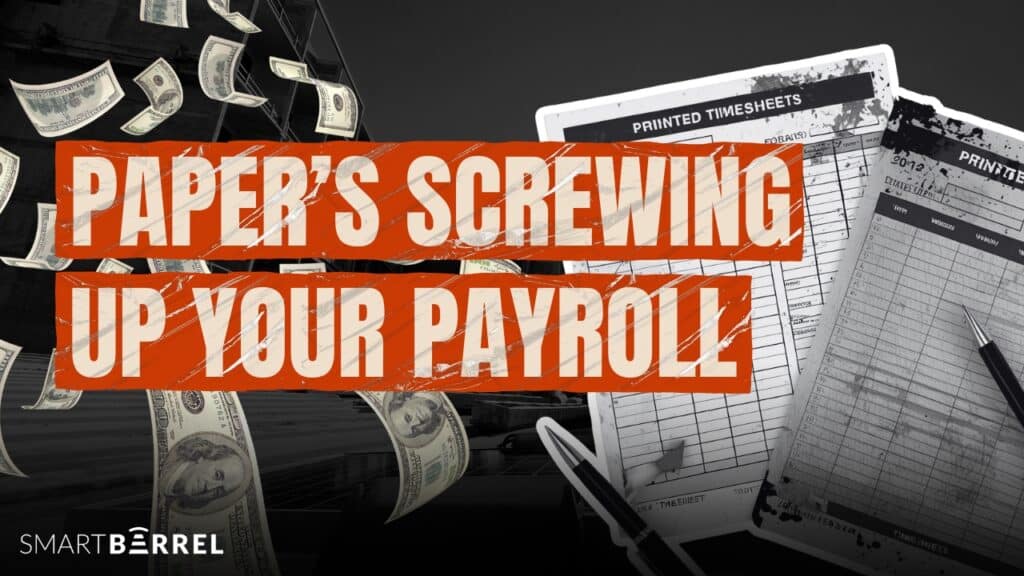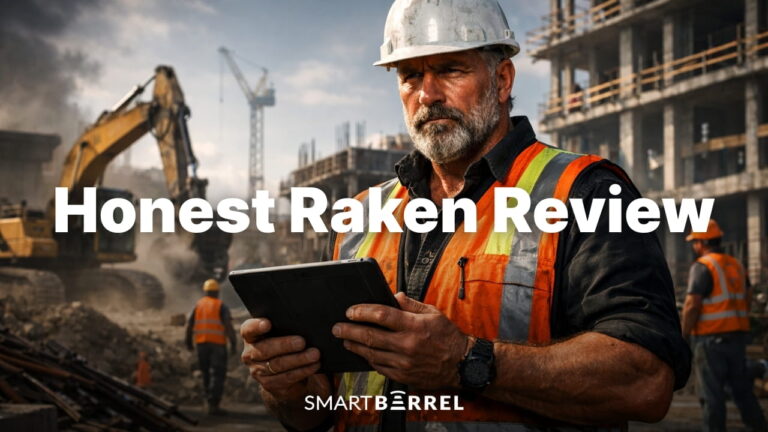Payroll delays are a known frustration in construction. What many contractors don’t realize is that these delays often have less to do with finance or admin bottlenecks and more to do with the tools being used to track time.
Paper timesheets might seem harmless, but they’re one of the biggest culprits behind inaccurate hours, approval slowdowns, and last-minute payroll scrambling. New research reveals how these manual processes have a broader financial impact. Around 76% of contractors report facing data integration challenges that can impact key processes, such as payroll, and even affect project outcomes.
The problem persists because paper-based systems lack the visibility and accuracy needed for today’s complex projects. What begins as a simple timesheet delay often snowballs into more significant cost overruns and payment disputes.
Understanding Payroll Delays In Construction
In construction, late payments aren’t new. Delays in payroll are often treated as just another admin hiccup – but the reality is, they impact much more than your accounting team.
When paychecks don’t land on time, it creates a ripple effect that hits crew morale, slows down fieldwork, and throws off the entire project schedule. And more often than not, the cause is something simple: a broken or outdated time tracking process.
Here’s what typically triggers payroll delays:
- Missing or incomplete timesheets that need to be tracked down or recreated.
- Manual errors in transcribing hours from paper to payroll systems.
- Bottlenecks in approvals, especially when supervisors are juggling multiple crews or sites.
- Last-minute corrections that hold up batch processing and delay payday for everyone.
None of these are one-time problems. If your time tracking process relies on paper, you’re stacking these risks every single pay cycle.
Related: What Paper Timesheets Are Really Costing Contractors in 2025.
Get Control of Your Time Tracking
What Happens If Payroll Is Late?
Late payroll isn’t just a finance issue, it’s a jobsite problem. When crews don’t get paid on time, productivity drops, loyalty slips, and timelines start to fall apart.
Here’s what that looks like in the field:
- Morale Takes a Hit: Missed or late paychecks lead to frustration and distrust. Crews that don’t feel valued are less likely to give full effort or stick around long-term.
- Turnover Increases: Skilled workers have options. If they can’t count on timely pay, they’ll move on to a site that’s more reliable. That leaves you short-staffed when you need them most.
- Buddy Punching Becomes Common: When frustration builds, so do bad habits. Workers may cover for each other with false clock-ins, especially if no one trusts the system to get pay right anyway.
- Productivity Issues: Crews that are distracted by payroll delays take longer to finish tasks. Breaks get longer, focus fades, and urgency disappears because morale drives momentum.
- Schedules Get Pushed: Delays in field performance lead to missed handoffs between trades. Small hiccups start to compound, and suddenly your completion date is up in the air.
- Costs Start to Climb: You can’t control materials or weather, but you can control payroll. When that slips, you risk overtime hours, rework, or expedited labor to get things back on track.
The above cases are only a few examples. The ripple effect of late payroll extends far beyond the paychecks and can severely hinder project success.
The Role of Paper Timesheets in Causing Payroll Delays
The fastest way to end late paychecks is accurate construction time tracking that removes manual entry and fixes approvals. Paper timesheets might feel familiar, but that’s exactly the problem. Construction is among the least digitized sectors, and many processes haven’t evolved with the jobsite. As project scopes grow and crews scale across multiple locations, paper just can’t keep up.
Here’s how paper timesheets cause payroll delays:
- Manual Entry Slows Everything Down: Someone has to fill them out. Someone has to approve them. Someone has to type them into payroll. That’s three chances for delays or mistakes. Multiply that by the number of employees, and you are bound to make an error.
- They Get Lost or Damaged: Timesheets in a foreman’s truck, or sitting on a desk, are easy to misplace. A coffee spill or wind gust shouldn’t be able to cause payroll delays, but with paper, it can.
- No Standard Format: Some crew members round up. Some skip breaks. Some scribble notes in margins. That lack of consistency makes it harder for payroll teams to verify anything quickly.
- Approval Bottlenecks: A paper sheet can’t send a reminder. It won’t ping a supervisor for review. When timecards are floating between desks or jobsites, approval cycles grind to a halt.
- No Real-Time Visibility: You only know there’s a problem after the pay period ends. Payroll delays can lead to late payments, incorrect hours, and frustrated workers asking why their check is short.
Paper timesheets might seem small in the grand scheme, but over the course of a project, they quietly create compounding risk. This is especially true when you are working with a tight schedule and a lean workforce.
The Hidden Costs Of Payroll Delays Caused By Paper Timesheets
While payroll delays might seem like a minor inconvenience, they can have far-reaching consequences. Late payroll can lead to several serious issues across your business:
Legal Penalties
Late payments or inaccurate paychecks can violate labor laws and worker agreements. In many regions, even one missed payday can open you up to penalties, back pay disputes, or legal action. Most subcontractors can’t afford to fight lawsuits or the bad publicity that comes with them.
Employee Dissatisfaction
Employees rely on consistency, and payroll delays can affect their trust in your intentions and ability to pay. Dissatisfied employees will start looking elsewhere or disengage from the work assigned to them.
Increased Admin Work
Every time a timesheet goes missing or needs correction, your office staff shifts from payroll processing to problem-solving. That eats up hours you can’t bill for—and puts other back-office tasks on hold.
A specialty contractor from Langley saved $1 million and experienced a 60% reduction in manual timekeeping with SmartBarrel. Learn how Syber Concrete virtually eliminated time discrepancies for 300 employees.
Disrupted Project Timelines
Payroll delays can slow down field momentum. Workers might show up late, leave early, or lose motivation to push through tight deadlines. Once timelines start slipping, re-aligning trades becomes a challenge, and recovery often means paying a premium.
Related: What Paper Timesheets Are Really Costing Contractors in 2025.
Get Control of Your Time Tracking
Best Practices To Prevent Payroll Delays In Construction
To prevent payroll delays and ensure smooth project execution, it’s crucial to implement effective strategies that streamline time tracking, reduce errors, and improve workflow efficiency. Here are some best practices to consider:
1. Go Digital
If your payroll still relies on handwritten timecards or spreadsheets, payroll delays are inevitable. Paper timesheets are easy to lose, hard to read, and slow to process. They’re also vulnerable to inaccuracies, especially when hours are logged from memory or passed along second-hand. Transitioning to a digital construction time tracking system helps eliminate those risks. Verified hours get logged in real time, which means your payroll team doesn’t have to chase data or question whether it’s legitimate.
Early-stage construction sites without electrical infrastructure benefit from a self-powered time tracking device that uses solar panels and cellular connectivity to capture accurate hours from day one.
2. Use Integrated Platforms
Capturing time is only half the battle. If your time tracking system doesn’t integrate with payroll or your project management software, someone still has to manually enter the hours—which creates a new risk for errors. The best systems connect directly with payroll tools and ERPs, allowing data to flow automatically. When time data goes straight from field to finance, approvals happen faster, and payroll gets processed without delay.
3. Ensure Real-Time Data Access
Construction moves fast. You can’t afford to find out at the end of the week that someone missed clock-ins or submitted hours late. Real-time visibility is the foundation of effective manpower tracking. You need to know who’s on site and how many hours they’ve logged, as it allows you to identify issues like false timesheets before they impact payroll. Instead of reacting to missing or incorrect time after the fact, you can make adjustments while there’s still time to fix it.
4. Train Employees
Even the best platform won’t help if your team isn’t using it correctly. Everyone from field crews, foremen, and back-office staff should understand how the system works and why accuracy matters. When workers know their time is being tracked precisely and that it ties directly to their paycheck, buy-in improves. Training should be simple and ongoing, especially for teams that rotate across sites or shift roles mid-project. You don’t want to waste your crew’s time learning the nuances of each jobsite.
5. Automate Alerts And Notifications
Digital tools offer more than just accurate logs. Automating things like missed punch alerts, timesheet approvals, or end-of-week summaries ensures nothing falls through the cracks. These features keep supervisors informed and reduce the number of last-minute fixes required before payroll runs. The more automation you build into your process, the less room there is for costly delays.
6. Conduct Regular Audits
Payroll issues often start with something small. Something like a duplicate entry, an unusually long shift, or a missed lunch. Reviewing time data before it’s processed can help you catch those red flags early. A quick spot audit each cycle adds a layer of quality control and helps build a culture of accountability across your teams.
ProTip: Want to simplify the audit process and reduce the chances of common mistakes in your timesheets? Learn how specialty contractor WPI completely eliminated timesheet errors for its 1,500+ field employees with SmartBarrel.
7. Use Tools Built For Construction
Not every digital time tracker is designed with jobsite realities in mind. Look for systems that work offline, support biometric or facial verification, and don’t rely on a Wi-Fi connection to function. The platform should work around how your crews operate, not the other way around. If it’s not fast, field-friendly, and easy to adopt, it won’t last.
The Benefits Of Replacing Paper Timesheets With Digital Time Tracking
Switching from paper timesheets to digital time tracking offers numerous advantages that can significantly improve payroll accuracy and overall efficiency.
Payroll delays disappear when you implement an automated construction time tracking solution that eliminates manual entry and gives you verified hours in real-time.
The table below highlights the key benefits:
Feature | Paper Timesheets | Digital Time Tracking |
Data Entry | Manual entry increases the risk of errors and delays. | Automates the logging of hours worked, reducing human error and saving time. |
Data Access | Timesheets must be collected and reviewed, causing delays. | Real-time data access allows immediate processing of payroll without waiting for timesheet submission. |
Record Consistency | Inconsistent formats and potential misplacement of timesheets. | Standardized records across all workers, ensuring consistency and easy processing. |
Approval Process | Paper timesheets require manual signatures, leading to bottlenecks. | Digital timesheets streamline approval, allowing managers to approve remotely and instantly. |
Payroll Efficiency | Payroll processing is slower due to manual checks and corrections. | Faster payroll processing due to automation and real-time updates. |
Compliance | Potential for non-compliance with labor laws due to errors or delays. | Built-in features ensure adherence to labor laws, break periods, and overtime policies. |
Get Control of Your Time Tracking
How SmartBarrel Eliminates Payroll Delays
SmartBarrel’s time tracking platform is designed to solve the common issues that cause payroll delays in the construction industry. Here’s how it works:
- AI-Powered Time Logging: Automatically tracks hours worked and ensures accurate time entries, reducing the risk of human error and the need for manual data entry.
- Real-Time Data Access: Provides project managers and payroll teams with immediate access to up-to-date timesheet data, speeding up the payroll process.
- Geo-Fencing & Mobile Access: Ensures workers clock in only at the jobsite with geo-fencing, eliminating offsite clock-ins and ensuring payroll data is always accurate and tied to the right location.
- Biometric Verification: Uses facial verification to verify employee attendance, reducing the chances of time theft or buddy punching, and ensuring that only the right people are logging hours.
- Seamless Payroll Integration: Integrates directly with payroll and ERP systems, automatically syncing timesheet data to avoid manual entry and ensure that payroll is processed quickly and accurately.
- Instant Approvals: Allows for digital approval workflows, so project managers can approve timesheets immediately without waiting for paper-based sign-offs or approvals.
Say Goodbye To Paper Timesheets And Payroll Delays With SmartBarrel
Paper-based timesheets are a thing of the past as they’re simply not built to handle the demands of modern construction projects. By switching to SmartBarrel, you’re eliminating the inefficiencies of manual tracking, improving payroll accuracy, and ensuring your projects stay on track.
Embrace the future of construction workforce management and ensure your workers are paid accurately and on time.
- Make Your Timesheets Error-Free: With automated time tracking, SmartBarrel significantly reduces the potential for mistakes that occur with paper timesheets.
- Keep Your Team Engaged: Timely payroll leads to a more satisfied, loyal workforce. Workers who are paid accurately and promptly are more motivated to stay committed to the job.
- Streamline Your Workflow: By integrating time tracking directly with payroll and project management tools, SmartBarrel reduces administrative overhead and accelerates payroll processing.
- Boost Your Project Efficiency: No more waiting for paper timesheets to be collected. Real-time data and instant approvals mean that payroll delays are a thing of the past, allowing your team to focus on getting the job done.
Ditching paper timesheets is more than just a technological upgrade. It’s a commitment to your team, your business, and the efficiency of every project you take on. Ready to build smarter? Let SmartBarrel help you move past the old, manual systems and embrace a future where payroll delays are a thing of the past. Book a demo today to see what digital time keeping can do for your company.




